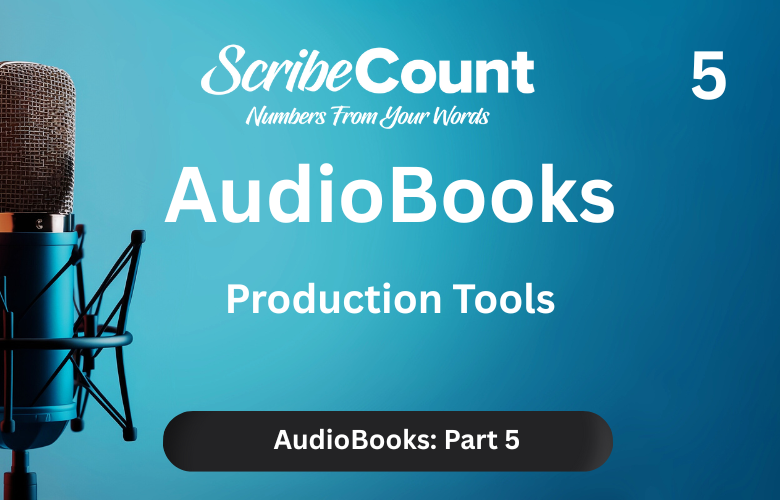Audiobook Production Tools for Indie Authors: Recording, Editing, and Everything In Between
Creating a professional-sounding audiobook used to require a high-end studio, expensive gear, and technical expertise. Today, indie authors can produce high-quality audio from home using a combination of powerful tools and software — many of them affordable or even free. Whether you’re narrating your book yourself, hiring a human narrator, or using AI, the tools you choose will directly impact your audio quality, workflow, and publishing success.
This guide breaks down the complete toolchain for audiobook production: recording, editing, mastering, AI voice tools, and distribution. We’ll also define key terms, offer recommendations, and score each tool for ease of learning, based on user reviews and industry experience.
Key Terms to Know
- DAW (Digital Audio Workstation): Software used to record, edit, and master audio.
- RMS (Root Mean Square): A measurement of loudness used to meet distributor standards (ACX requires -23 to -18 dB).
- Noise Floor: The baseline of background noise in your audio; must be below -60 dB for most platforms.
- Mastering: Final processing of an audio file to ensure it meets technical specs for volume, tone, and consistency.
- Plosives: Hard consonant sounds (like P and B) that create bursts of air and distortion in recordings.
- Pickups: Corrections or re-recorded sections inserted into an audiobook after initial recording.
Recording Tools: Capture Clean Audio at the Source
|
Tool |
Description |
Price |
Learning Curve |
Link |
|
Audacity |
Free DAW perfect for beginners |
Free |
Easy |
|
|
Reaper |
Pro-level DAW with full customization |
$60 |
Moderate |
|
|
Adobe Audition |
Industry-standard DAW with advanced tools |
$20.99/mo |
Advanced |
|
|
GarageBand |
Mac-only, simple DAW for basic narration |
Free (Mac) |
Easy |
|
|
TwistedWave |
Web-based audio recorder with high-quality features |
$10/mo |
Easy |
Microphones and Interfaces: Hardware Matters
|
Product |
Type |
Price Range |
Best For |
Link |
|
Blue Yeti X |
USB condenser mic |
$130 |
Beginners |
|
|
Rode NT1-A |
XLR condenser mic |
$229 |
Intermediate/Pro |
|
|
Shure MV7 |
USB/XLR hybrid mic |
$250 |
Podcast-style narration |
Shure MV7 |
|
Focusrite Scarlett 2i2 |
Audio interface |
$179 |
Connecting XLR mics |
|
|
Sony MDR-7506 |
Closed-back headphones |
$99 |
Monitoring while recording |
Editing and Mastering Tools: Polish Your Audio
|
Tool |
Description |
Price |
Learning Curve |
Link |
|
Auphonic |
Automatic mastering, leveling, noise reduction |
Free–$11/hr |
Easy |
|
|
iZotope RX Elements |
Noise cleanup, de-click, de-ess plug-ins |
$129 |
Moderate |
|
|
Waves NS1 |
Simple noise suppressor plugin |
$49 |
Easy |
Waves NS1 |
|
Hindenburg Narrator |
DAW built for spoken word production |
$12.90/mo |
Moderate |
|
|
Ocenaudio |
Lightweight alternative to Audacity |
Free |
Easy |
AI Voice Tools: Narrate Smarter, Not Harder
|
Tool |
Description |
Price |
Learning Curve |
Link |
|
ElevenLabs |
AI voice cloning and narration for audiobooks |
$5–$99/mo |
Moderate |
|
|
Google Play TTS |
AI narration built into Google Play Books |
Free |
Easy |
|
|
Descript |
All-in-one AI editor with overdub features |
$12–$24/mo |
Moderate |
|
|
DeepZen |
AI narration with emotional realism |
Contact |
Moderate |
|
|
Speechki |
AI voice provider for audiobook and content creators |
Contact |
Moderate |
Distribution and Delivery Tools: Get Your Audio to Readers
|
Tool |
Description |
Pricing |
Learning Curve |
Link |
|
ACX |
Amazon’s audiobook distribution to Audible, iTunes, Amazon |
Free |
Moderate |
|
|
Spotify Audiobooks |
Wide distribution + retail sales |
Free–99% royalty share |
Moderate |
|
|
Google Play Books |
Sells AI or human narrated books |
Free |
Easy |
|
|
BookFunnel |
Direct audiobook delivery tool |
$20+/mo |
Easy |
|
|
Authors Direct |
Direct sale platform via Findaway (Spotify) |
Free–commission-based |
Easy |
Final Thoughts: Build the Right Stack for Your Audiobook Strategy
Audiobook production doesn’t have to be intimidating. With the right tools — from reliable microphones to simple mastering platforms and innovative AI narrators — indie authors can create studio-quality audio from a home setup. Whether you want to narrate yourself, clone your voice, or hire pros, your gear and software choices will shape both your production quality and your return on investment.
Start with tools that match your skill level. As you gain confidence, layer in advanced plugins or voice automation. The key is building a stack that supports your publishing goals — whether you're building a backlist, launching in multiple formats, or growing a direct sales brand.
